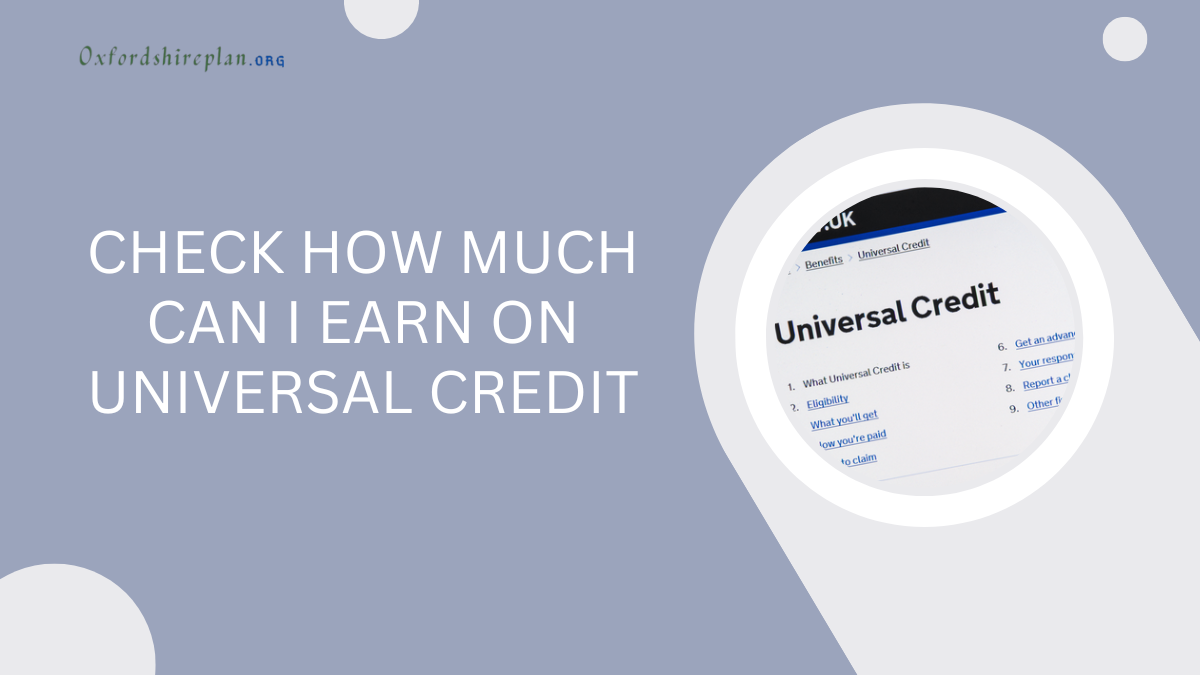Contents
- Understanding Your Earnings and Universal Credit
- How to Calculate Your Universal Credit Payments
- Determine Your Standard Payment Amount
- Add Any Extra Payments (Elements)
- Adjust for Income and Savings
- Check for the Benefit Cap
- Account for Deductions
- How Earnings Impact Your Universal Credit
- Understanding the Impact of Earnings
- What is a Work Allowance?
- What Counts as Earnings?
- What Doesn’t Count as Earnings?
- How Your Savings and Capital Affect Universal Credit
- What is Capital?
- How Capital Affects Your Payments
- Exceptions to the £16,000 Rule
- Important Note on Capital Spending
- How Other Types of Income Affect Universal Credit
- Incomes That Reduce Your Universal Credit
- Incomes That Don’t Reduce Your Universal Credit
- Ignored Incomes
- What Happens if Your Universal Credit Payment Is Reduced to Zero?
- Ending Your Claim
- Reapplying for Universal Credit
- Keeping Your Claim Open
- Understanding the Benefit Cap
- What is the Benefit Cap?
- Who is Exempt from the Benefit Cap?
- Exceptions and Grace Periods
- Understanding Deductions from Your Universal Credit
- Why Your Payment Might Be Reduced
Understanding Your Earnings and Universal Credit
Many ask How much can I earn on Universal Credit; It’s a common question with a somewhat complicated answer. The amount you can earn while still receiving Universal Credit depends on various factors. While it might seem tricky, understanding how to calculate your potential payments can help you better manage your finances. For accurate numbers, it’s advisable to consult a financial adviser or use an online benefit calculator to get an estimate. Before diving into calculations, make sure you meet the eligibility criteria for Universal Credit. 
How to Calculate Your Universal Credit Payments
Calculating your Universal Credit amount involves several steps. Here’s a breakdown to help you understand the process:
Determine Your Standard Payment Amount
Your basic Universal Credit payment, known as the “standard amount,” varies depending on your age and relationship status. If you have a partner and live together, your payments will be combined into a single amount. Make sure to keep the Department for Work and Pensions (DWP) informed about any changes in your relationship status, as this could affect your payment.
Add Any Extra Payments (Elements)
In addition to the standard payment, you might be eligible for extra payments, also known as “elements,” based on your specific circumstances. These can include:
- Housing Costs: If you rent or have a mortgage.
- Children: If you are responsible for any children.
- Childcare Costs: If you pay for childcare while working.
- Exceptional Circumstances: This can include moving from other benefits, having limited capability for work, receiving a severe disability premium, or being a career.
These additional elements are added to your standard Universal Credit payment.
Adjust for Income and Savings
Your Universal Credit payment might be reduced based on your income and savings. This includes:
- Earnings from Work: Any money you or your partner earn.
- Savings: If you have savings or investments over £6,000.
It’s important to note that the income and savings of dependent children or other household members do not affect your Universal Credit.
Check for the Benefit Cap
The Benefit Cap limits the total amount of benefits you can receive. If your Universal Credit exceeds this limit, your payment may be reduced. Checking whether this cap applies to you is essential for accurate financial planning.
Account for Deductions
Your Universal Credit payments might also be reduced if you have:
- Advance Payments: Repaying any money you borrowed in advance.
- Sanctions: Penalties for not meeting certain conditions.
- Overpayments: Repaying any excess payments you received.
- Child Maintenance: Payments you make for child support.
- Debts or Fraud Issues: If you owe money or have committed benefit fraud.
How Earnings Impact Your Universal Credit
Understanding the Impact of Earnings
As your earnings increase, your Universal Credit payments decrease. Specifically, for every £1 you or your partner earn above the income tax threshold, your Universal Credit payment is reduced by 55p.
What is a Work Allowance?
A work allowance is the sum you can earn before your Universal Credit begins to reduce. You qualify for a work allowance if you have caring responsibilities for a child or limited work capability. Your eligibility for the Universal Credit or Housing Benefit housing element determines how much your payments reduce.
What Counts as Earnings?
Earnings that affect your Universal Credit include:
- Wages and overtime
- Tips and commissions
- Bonuses
- Holiday pay
- Sick pay
- Maternity, paternity, adoption, or shared parental pay
What Doesn’t Count as Earnings?
Some earnings are not counted when calculating your Universal Credit, such as:
- Income tax payments
- National Insurance contributions
- Pension payments
- Work-related expenses
- Mileage allowances
- Non-cash benefits like childcare vouchers
How Your Savings and Capital Affect Universal Credit
What is Capital?
Capital refers to your savings and other financial assets, such as:
- Cash
- Property (excluding your primary home)
- Shares and investments
It’s important to note that personal possessions, business assets, and your primary residence are not included in this calculation.
How Capital Affects Your Payments
- £6,000 or Less: If your capital is £6,000 or less, it won’t affect your Universal Credit.
- More than £6,000 but Less than £16,000: If you have more than £6,000 but less than £16,000, your payments will be reduced by £4.35 for every £250 (or part thereof) above £6,000.
- More than £16,000: Generally, if your capital exceeds £16,000, you won’t qualify for Universal Credit.
Exceptions to the £16,000 Rule
If you’re part of a managed migration program, you might still qualify for Universal Credit even if your capital exceeds £16,000.
Important Note on Capital Spending
Spending your savings or capital to increase your Universal Credit payments can be considered “notional capital” by the DWP unless you use it for legitimate reasons like paying off debts or mortgage payments.
How Other Types of Income Affect Universal Credit
Incomes That Reduce Your Universal Credit
Certain types of income will reduce your Universal Credit payments, including:
- Pension payments or annuities
- Maintenance from a partner (excluding child maintenance)
- Insurance payments
- Specific benefits like Carer’s Allowance, Incapacity Benefit, Maternity Allowance, Employment and Support Allowance, and Jobseeker’s Allowance
Incomes That Don’t Reduce Your Universal Credit
The following types of income do not reduce your Universal Credit:
- Child Benefit
- Disability Living Allowance
- Personal Independence Payment
- Bereavement Support Payment
- War pensions
- Adult Disability Benefit
- Child Disability Benefit
Ignored Incomes
Some regular incomes are ignored and won’t impact your Universal Credit, such as:
- Payments for caring for children, like adoption or fostering payments
- Regular charity donations
- Financial help from family members
- Rent from a room you let out in your home
What Happens if Your Universal Credit Payment Is Reduced to Zero?
Ending Your Claim
If your Universal Credit payment is reduced to zero, your claim will end. The Jobcentre will notify you if this happens.
Reapplying for Universal Credit
If your claim ends because your income has increased, you can reapply for Universal Credit if your income decreases later. You will need to start a new claim.
Keeping Your Claim Open
If you expect your income to decrease within the next five months, you can ask the DWP to keep your claim open. They will monitor your earnings and restart your claim if your income drops.
Understanding the Benefit Cap
What is the Benefit Cap?
The Benefit Cap limits the total amount of benefits you can receive. If your Universal Credit exceeds this cap, your payment might be reduced.
Who is Exempt from the Benefit Cap?
You won’t be affected by the Benefit Cap if:
- You or your partner earn at least £793 a month after tax
- You receive the Limited Capability for Work-Related Activity (LCWRA) element of Universal Credit
- You receive the carer element or Carer’s Allowance
- You get certain benefits related to sickness, disability, or caring responsibilities
Exceptions and Grace Periods
You might be eligible for a grace period if you recently lost your job or your earnings have decreased. This allows you to receive Universal Credit without the Benefit Cap applying, giving you time to adjust to your new financial situation.
Understanding Deductions from Your Universal Credit
Why Your Payment Might Be Reduced
Your Universal Credit payment can be reduced for several reasons, including:
- Repaying advance payments or budgeting advances
- Sanctions for not meeting requirements
- Repaying overpayments
- Making child maintenance payments
- Repaying debts or issues related to benefit fraud
If you need clarification about how your earnings, savings, or other income affect your Universal Credit, speaking with a financial adviser for personalized advice is a good idea.
Check This
|
British Citizenship Test: Know Everything Child Arrangement Order UK: Know Everything The biggest mistake parents make when setting up a trust fund UK |

Jonathan is an avid automobile enthusiast who is passionate about all things on wheels. From the latest car models to classic vintage rides, I love exploring the automotive world’s intricate details and engineering marvels. With years of experience in test-driving, reviewing, and analyzing cars, I provide readers with comprehensive insights and honest opinions.















